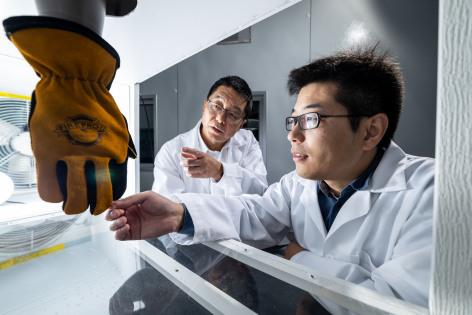Iowa State researchers are working to improve the safety and function of protective gloves. Video by Dave Olson
AMES, Iowa – Guowen Song picked a pair of gloves from the different styles lining a table inside his Labs for Functional Textiles and Protective Clothing to demonstrate why it is time for an upgrade. Without even trying on the glove, it was easy to see how the thick, bulky material designed to protect the hand severely limits comfort and dexterity for firefighters and first responders.
Song, an associate professor and the Noma Scott Lloyd Chair in Textiles and Clothing, recognizes the challenges existing protective gear create for firefighters and first responders. A $1.5 million grant from the Department of Homeland Security and Federal Emergency Management Agency will allow Song and an interdisciplinary team of Iowa State University researchers to work on the safety and function of heat-protection gloves as part of the personal protective equipment system for firefighters and other first responders.
“The current gloves are not really engineered to meet the basic requirements of protection, comfort and good manual performance. Firefighters lose more than 50 percent of their manual dexterity,” Song said. “With our combined expertise and advanced facilities, we can focus on these challenges and develop the next generation of personal protective equipment for better safety and health.”
Achieving that goal requires an integrative approach. Song says the study is a collaborative effort with ISU researchers in textiles and clothing design, human physiology, numerical simulation, mechanical, chemical and biochemical engineering, performance evaluation and simulation as well as fire departments and manufacturers. And the glove is just the beginning. In the next stage, researchers want to apply what they learn to other types of protective gear, such as boots and helmets, for firefighters and other emergency responders.
Sweating hand, mannequin benefit lab simulations

Associate professor Guowen Song and graduate student Rui Li using a sweating hand model to test different gloves. Photo by Ryan Riley, College of Human Sciences
Getting to this stage has taken years of work and access to sophisticated lab equipment (see above video). Using a sweating hand model, Song and graduate student Rui Li have conducted a series of experiments to measure how parts of the hand and fingers respond to heat, wind and cold. The database they created will provide a foundation for the team’s work to develop a hand-specific thermal regulation model.
For example, the database shows how cold affects the forefinger and pinky finger differently. The researchers can use this information to select and design materials for the glove to maximize protection and comfort. In a 2017 study, published in Textile Research Journal, Song and his colleagues found the combination of moisture – from firefighters sweating – and heat interacting with different protective fabric systems can contribute to skin burn injuries – another factor to consider with the gloves.
Song says the work would not be possible without the sophisticated equipment developed in the Lab for Clothing Comfort Performance. The sweating hand model sweats like a human hand so researchers can test the performance of different textiles, materials and products. His lab is also equipped with a full-size sweating mannequin to test for comfort with all types of protective gear. In the Lab for Heat and Thermal Protection Research, Song can test how textiles respond to various hazards including fire, hot liquid and steam.
“The lab simulations combined with the human trials in this next phase will give us a good idea of how the design and the material will affect the performance of personal protective equipment,” Song said.
Other members of the research team include: Ellen McKinney and Chunhui Xiang, Apparel, Events and Hospitality Management; Warren Franke and James Lang, Kinesiology; James Rossmanith, Math; Lizhi Wang, Industrial & Manufacturing Systems Engineering; Xinwei Wang, Mechanical Engineering; and Daniel Russell, Human Development and Family Studies.